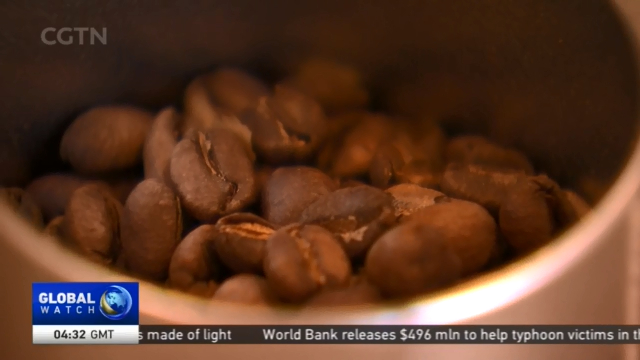
13:35, 03-Oct-2018
China Market, World Opportunity: Tea-loving country develops a taste for caffeine competitor
Updated
12:49, 06-Oct-2018
02:54

In a tea-loving country like China, coffee has faced an uphill battle winning people over. As a mostly imported drink, instant coffee still takes the lion's share in the Chinese coffee market. But in recent years, the expansion of chains like Starbucks and independent coffee shops has created a niche, and many even brew their own coffee at home. CGTN's Wang Mengzhen tells us more.
Brewing and enjoying a cup of coffee at home, a weekend ritual for Li Chen and his wife Xiaozhou. Eight years ago, the young couple fell in love with each other at first sight in a coffee shop.
Since then, Li has collected coffee bean bags from around the world.
LI CHEN COFFEE LOVER "For me, coffee was an exotic item shown in TV dramas but later I got to know that it has a long history, perhaps as long as Chinese tea."
Now he's very proud of such a huge collection.
LI CHEN COFFEE LOVER "Now it has become part of my lifestyle. The aroma of coffee really cheers me up and helps release my pressure. It could always be euphoric."
Sometimes his wife gets picky about the coffee Li makes, but that's partly why he says true to his passion.
LI CHEN COFFEE LOVER "The air, temperature, humidity and even your mood can influence the quality of the coffee you brew. It's these unpredictable factors that really motivate me to keep pursuing 'the best' coffee I can possibly make in my lifetime."
WANG MENGZHEN BEIJING "Located in a typical Beijing Hutong, this indie coffee shop is one of the favorite spots for Li Chen and his wife to hang out. Though a Starbucks is just 20 metres away, the boss never worried about its business even in a working day afternoon."
From an IT industry talent to an owner of three Beijing coffee shops, Zhao says each of his shops sells upwards of 100 cups of coffee per day. And most of the beans he uses are imported.
ZHAO YINAN, OWNER COFFEETAGS, BEIJING "Usually the suppliers offer us a variety of beans and we will choose the most cost effective and popular ones after testing. Since each country has its own production season, we import from various countries including Ethiopia and Kenya in Africa as well as Brazil and Costa Rica in Latin America."
Born in the 80s, Li Chen and Xiaozhou represent an emerging Chinese population: the younger generation who has made coffee a part of their daily routine. And with China's coffee consumption per capita still far behind the global average, the remaining market potential is tremendous. WMZ, CGTN, Beijing.

SITEMAP
Copyright © 2018 CGTN. Beijing ICP prepared NO.16065310-3
Copyright © 2018 CGTN. Beijing ICP prepared NO.16065310-3